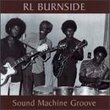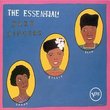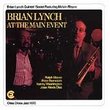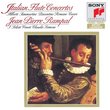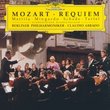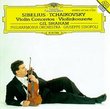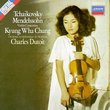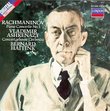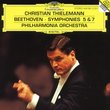| All Artists: Tchaikovsky, Ogdon, Monteux Title: Monteux Conducts Tchaikovsky at the 1963 Vienna Festival Members Wishing: 0 Total Copies: 0 Label: Vanguard Classics Release Date: 5/5/1993 Genre: Classical Styles: Forms & Genres, Concertos, Instruments, Keyboard, Symphonies Number of Discs: 2 SwapaCD Credits: 2 UPC: 723918803128 |
Search - Tchaikovsky, Ogdon, Monteux :: Monteux Conducts Tchaikovsky at the 1963 Vienna Festival
 | Tchaikovsky, Ogdon, Monteux Monteux Conducts Tchaikovsky at the 1963 Vienna Festival Genre: Classical
|
CD DetailsSimilar CDs
Similarly Requested CDs
|
CD ReviewsWhat Monteux & Tchaikovsky REALLY sound like. furiant@sprint.ca David Cavlovic | Toronto, Ontario, Canada | 02/13/1999 (5 out of 5 stars) "In the epoch of great conductors who have left behind a vast legacy of commercial studio recordings--from Furtwängler through Richard Strauss, Koussevitzky, Klemperer, Munch, Reiner, Karajan, Bernstein and Solti--Pierre Monteux has contributed his fair share of excellent performances. What all these conductors have in common is that their "studio" performances were always a tad less dramatic than their "live" performances. Many hated the studio. Indeed, both Bernstein and Karajan started issuing live performances instead of studio recordings towards the end of their careers. We can easily hear the differences thanks to the many broadcast recordings that are now available on CD. But to have an actual live performance of someone of the stature of Monteux properly miked and stereophonically balanced is a rare treat indeed. Compare these performances of this live recording from the Vienna Festival of May 31, 1963 with Monteux's various studio recordings of both Romeo and Juliet and the Fifth Symphony and the difference in intensity is abundantly clear. Face it, a perfomance, any performance, needs audience "kinetic energy" feedback. The drama, pacing and excitement of these performances are spine-tingling. Add to this an incredible performance of the First Piano Concerto by the talented (and tragic) genious John Ogdon--the only documented recording so far known of the work by Monteux--and you have a 2 CD set that is priceless. It is one that I return to time and time again." Passionate, paced Tchaikovsky by LSO, Monteux, Ogdon Dan Fee | Berkeley, CA USA | 04/17/2004 (5 out of 5 stars) "The late and great Pierre Monteux was a superb representative of a very gifted generation of musicians. He steadied the helms of several USA orchestras, including San Francisco, and Boston; before he took the podium with the LSO in his later years. You would never know there was an old man at the helm in these performances, except that perhaps you will sense the unusual wisdoms evidenced by his leadership as the concert proceeds.
And, this recording is very much a performance. It was recorded live at the Vienna Festival during an LSO appearance. The audience is preternaturally quiet and well behaved. You only realize you have been surrounded by occupied seats when everybody breaks into applause at the end of a work. The stereo 16-bit CD set ... now available from Artemis, which is re-releasing masters drawn from the old Vanguard Recording Society archives .... well the regular CD is good. The DVD-audio ... now available in a new release from Silverline Classics (who have earlier been not too good at releasing actual classics) is just that much better. For starters, the DVD will give you the choice of sonic formats, allowing you to adjust for the sake of bringing out the best in your own particular set-up. You can play the higher resolution DVD on any system. You can choose among stereo Dolby Digital or 24-bit stereo; or go for multichannel surround sound in either Dolby Digital or pure 24-bit uncompressed reproduction. A quick comparison in my own system reveals that all the different versions available actually sound good; and the wonders of the multichannel versions are quite subtle at first as your ears and brain adjust to the added recreation of the music and the hall in which it is being played. Also, to get the best out of the pure 24-bit medium I needed to keep the volume up pretty well, otherwise soft passages are too soft and the larger sound staging possible via multichannel presentation loses its marvelous, compelling presence. As regards these performances, you can hardly go wrong. The opener, the tone poem Romeo and Juliet, has long been a classic hit from Tchaikovsky's oeuvre. While many critics still like to indulge their false superiority by damning the composer with faint praise, I dare anybody to sit down and dash off a living, breathing, pulsing melody like the theme which characterizes the two young lovers. Yes, Tchaikovsky's music often suffers the most appalling abuses: tempos are too slow or too fast in many instances, leaving you with a sense of neurotic-dramatic contrast that is not balanced with a corresponding sense of the larger shape of the musical whole. On the other hand, just playing Tchaikovsky real straight, while it cleans up a lot of hysterical grandstanding on the conductor's part, fails at times to show the living, breathing pulse at which Tchaikovsky is past master.So do Maestro Monteux and the LSO show their mettle. The phrasing is alive and breathing, and the music always has a pulse, dramatic or lyrical. There is narrative: a larger sense of musical structure within which things unfold. ABA is simple, but it is not meaningless. Monteux embodies this insight to perfection. Conducting/music students would do well to study this. They may remind themselves how to keep music alive and in balance, even when playing Tchaikovsky. After the rousing-tender tone poem, John Ogdon joins in a quite profoundly musical first piano concerto. Like all the Tchaikovsky hits, this concerto is deservedly famous and often malignantly abused by pianists who are desperately trying to get a new angle on a thrice-familiar work. Ogdon and Monteux, helped by committed playing in all LSO departments, show that you can just approach the music, musically. Extremes are not needed. Ogdon's technique is quite up to the virtuoso demands, first on display in the USA in Boston in the premiere by none other than Liszt's ex-son-in-law, Hans von Bulow. (He lost Cosima to Herr Wagner.) But the points that Ogdon et al. make are not primarily virtuoso points. You cannot help being charmed, all over again, as you listen to this concerto. It is silvery and bright when needed, but above all it has incredible warmth and quite a few touches of fun. Finally, the evening concludes with Symphony 5. The choice of this symphony in itself shows Monteux's distinctive showmanship that aimed primarily at musical ends. An easy mistake would have been to use the sixth symphony, instead. As it stands, this reading of the fifth exhibits all the generosity, brilliance, and tenderness that were revealed, previously. The balletic graces attend the symphony in Monteux's hands, although not to the exclusion of other graces invited also to be present. The scoring of the symphony reminds us that Tchaikovsky was also the composer of the indelible Nutcracker; and the genius of the scoring is something wonderful, especially in this recording in 24-bit sound. The LSO woodwinds are star players. The brass make good points without having to steal the show or upstage everybody else in the orchestra. And the strings can languish and sigh, as well as sing wholeheartedly, as well as dance. The Silverline Classics DVD version is not easily found on this website; but it is available, just check around. AMAZON is dropping the ball on high resolution. If the Silverline Classics remasterings of these gems are representative, we are in for quite a high resolution treat. Future releases may include the Brahms and Sibelius symphonies by Maurice Abravanel/ Utah. These master tapes are treasures, and the stunning 24-bit versions are refreshing droplets from the golden grail of sound, and of music performances. Pricing will be moderate, apparently. Five stars, going on a hundred, then. Play the CD. Otherwise play the DVD. You will probably Interrupt whatever else you are doing, for a while. Highly recommended: sound, and great music." |

 Track Listings (4) - Disc #1
Track Listings (4) - Disc #1